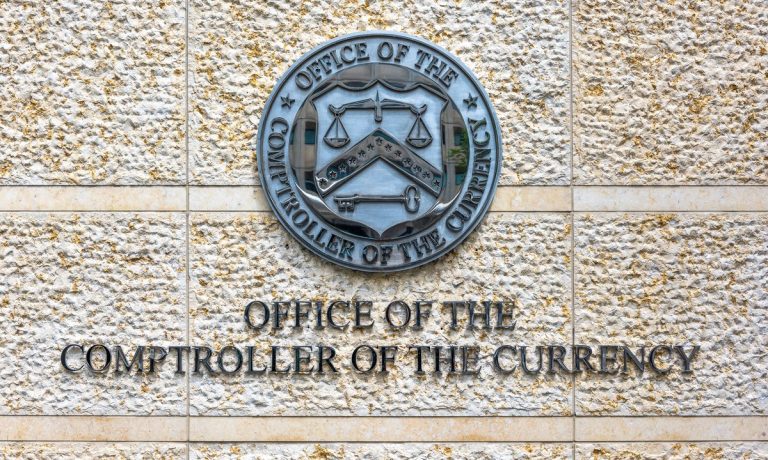SoFi Bank Charter Ruling Signals Crypto Still Off Limits for Banks

In a ruling that has big implications for banks’ ability to use stablecoins as payment tools, the Office of the Comptroller of the Currency (OCC) announced in a Tuesday (Jan. 18) press release that FinTech lender SoFi will be allowed to buy a Federal Deposit Insurance Corporation (FDIC)-insured national bank as long as it stops offering cryptocurrency trading services.
SoFi, which stands for Social Finance, is a lender focused on personal and student loans, but it also provides several investment offerings, including a crypto trading service that offers 30 cryptocurrencies.
The OCC said Tuesday it had approved SoFi’s purchase of California-based Golden Pacific Bank, National Association, in order to create SoFi Bank, N.A. Among the conditions: “confirmation that the resulting bank will not engage in any crypto-asset activities or services,” according to the release.
Reading between the lines, the bank regulator’s decision strongly suggests that its November announcement ordering banks to ensure they have adequate controls in place and to get pre-approval — technically “non-objection” — from the bank regulator before engaging with cryptocurrencies will be very hard to come by.
Early Stablecoin Skepticism
That fits in with Acting Comptroller of the Currency Michael Hsu’s Nov. 23 ruling, which essentially clawed back his predecessor’s rulings that banks can hold cryptocurrencies for customers, can hold dollar reserves for stablecoin issuers and can use stablecoins to make payments.
Read more: Comptroller of the Currency Backpedals on Rulings Allowing Banks to Handle Crypto
Those rulings were made by Acting Comptroller of the Currency Brian Brooks — formerly Coinbase’s general counsel and now CEO of crypto mining computer manufacturer Bitfury — and were considered hugely important to the integration of the cryptocurrency industry into banking. Calling them a “huge win” for the industry, Jeremy Allaire, CEO of USDC stablecoin issuer Circle, said at the time that Brooks’ rulings paved the way for the use of stablecoins “as a mainstream payment medium for all forms of payments and settlement.”
In May, one of Hsu’s first acts at the OCC was to pause those rulings for review. On the surface, that review ended well for crypto, with Hsu’s agency simply saying that “banks must be able to demonstrate that they have appropriate risk management systems and controls in place to conduct them safely, [providing] assurance that crypto-asset activities taking place inside of the federal regulatory perimeter are being conducted responsibly.”
And in fact, that’s precisely what the text of the actual letter approving the merger said, requiring SoFi Bank to obtain “prior written determination of no supervisory objection from the OCC” before engaging “in any crypto-asset activities or services currently performed by SoFi Inc.”
See also: OCC Urges ‘Caution’ for FIs Offering Crypto-Related Financial Services
Bu, that’s not what Hsu said in the accompanying press release, which contains no such caveat about prior approval or permission to offer any crypto services — whether related to crypto trading or using stablecoins for back-end transaction settlement.
By bringing the large FinTech “inside the federal bank regulatory perimeter,” Hsu said in the release, the OCC’s action “levels the playing field and will ensure that SoFi’s deposit and lending activities are conducted safely and soundly, including limiting the bank’s ability to engage in crypto-asset activities.”
That sure sounds like Hsu saying crypto-asset activities are unsafe and unsound.
He added: “This action is consistent with the comprehensive legal and policy review of pending licensing decisions I initiated last May.”
Reading the Tea Leaves
At the same time, it’s not fair to say Hsu is dead-set against stablecoins — or crypto.
Read more: Stablecoins Can Boost Innovation If Regulated Like Banks
In a stablecoin-focused speech on Jan. 13 about “The Future of Crypto-Assets and Regulation,” Hsu called the rapidly mainstreaming crypto market “exciting” and added that “bank regulation would give credibility to the ‘stable’ part of stablecoins.”
See also: Treasury Official Presses Congress to Create Uniform Crypto Framework
He also advocated “regulating stablecoin issuers as banks” in order to “enable more innovation in crypto and make those innovations more durable.”
But the OCC’s SoFi decision suggests that finding that happy medium before Congress puts comprehensive crypto regulations in place will be a steep hill to climb.
Read also: Six Crypto Execs Warn Congress Not to Overregulate Crypto